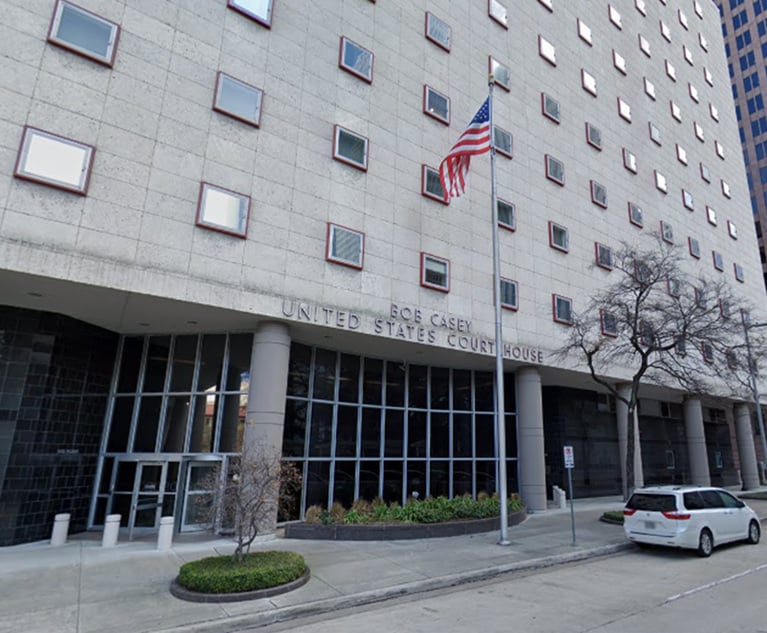As Coronavirus Shutters Quinn's NY Office, Firms Weigh Remote Work Options
Law firms face a test over how to conduct business effectively with offices closed. But if the virus wreaks enough economic havoc, remote working may be the least of their problems.
March 09, 2020 at 06:08 PM
5 minute read
The original version of this story was published on The American Lawyer
 A commuter wears a face mask in the Metro Center train station in Washington, D.C., U.S., on Feb. 28. Photo: Sarah Silbiger/Bloomberg
A commuter wears a face mask in the Metro Center train station in Washington, D.C., U.S., on Feb. 28. Photo: Sarah Silbiger/Bloomberg
Quinn Emanuel Urquhart & Sullivan's weeklong closure of its New York office after a partner tested positive for the COVID-19 coronavirus is forcing the industry to reckon with a serious question: Can Big Law work remotely?
A number of law firm leaders said in interviews Monday that they're equipped and ready to have their lawyers and staff work from home for the short term. But working remotely for a long period of time poses a major test for an industry that is built on relationships.
"The legal industry is still an apprenticeship, and we're still trying to train our young lawyers to become partners and take over the firm and become the next generation of firm leaders," said Peter Miller, the chair and managing partner of Seyfarth Shaw. "There's no substitute for face-to-face teaching and the like."
Fully remote work can weigh on a law firm's culture and "cohesion," said Dion Cominos, the managing partner of Gordon Rees Scully Mansukhani. Approximately 10% to 20% of Gordon Rees' lawyers work mainly remotely, but that has to be balanced out with in-person meetings and social functions, he added.
"You still have a need for people to feel connected to a larger whole. If you're doing everything virtually, it can be isolating," Cominos said.
Legal recruiting and developing new clients can also take a hit if in-person meetings are put on the back burner, said Zeughauser Group consultant Kent Zimmermann, adding that it's "hard to close the deal remotely."
In technical terms, plenty of aspects of a legal practice can be performed remotely, law firm leaders noted, including actually closing a deal for clients. Certain activities do require personal contact, including jury selection, oral arguments and going to trial.
Some of those activities are already starting to be curtailed in the face of a virus that has infected over 113,700 people and killed at least 3,999 people across 97 countries as of Monday afternoon, according to a New York Times tally. On Monday, the U.S. Court of Appeals for the Ninth Circuit announced it was canceling all en banc hearings and non-case related meetings scheduled for this week.
Separately, the U.S. District Court for the Southern District of New York on Monday announced it was banning all persons who have been to China, Iran, Italy, Japan and South Korea within the past 14 days.
Quinn Emanuel opted to close its New York office—where more than 200 of its lawyers are based—after one of its partners contracted the coronavirus. Earlier this month, lawyers at the small Midtown Manhattan law firm of Lewis and Garbuz were sent home after one of the firm's lawyers tested positive for the coronavirus.
The closure of Quinn Emanuel and Lewis and Garbuz comes as a growing number of firms are creating working groups to advise clients on how the virus will impact them, while the firms themselves are canceling partner retreats and restricting travel.
Leaders at Perkins Coie, for example, said they're implementing business resiliency plans they drafted months ago, before the coronavirus was known. Although the firm hasn't closed any of its 21 offices, it has restricted travel for its lawyers and staff and canceled all large internal and external events meetings through April 1.
"We're already a dispersed global set of teams. It's a matter of moving them out a little further in terms of local workspaces," said Rick Howell, the firm's chief information officer.
Remote working may be a challenge for law firms, but Zimmermann believes the real disruption will come as firms begin to feel the impact of the broader economic crisis sweeping whole countries and industries due to the virus. On Monday alone, the Dow Jones Industrial Average dropped nearly 8%—more than 2,000 points.
The U.S. legal industry was, on average, already seeing weaker demand in a strong economy, according to data from Citi Private Bank's Law Firm Group and Wells Fargo Legal Specialty Group, Zimmermann said. What happens if the economy does go into a downturn, he asked.
"The question of working remotely is one thing. But a much bigger issue for law firms is what the macro economy does to the demand environment," Zimmermann said. "With the uncertainty a weakening macro-economy brings, that's going to slow down many transactions, if not throw pause them or throw them off-track. It's going to slow spending."
Read More
International Partners Will Not Attend UK Firm Conference Over Virus Fears
Coronavirus Closures Hit Law Schools at Stanford, Columbia and Several Others
Sidley Austin Cancels Partners Meeting in Florida Amid Coronavirus Spread
NOT FOR REPRINT
© 2025 ALM Global, LLC, All Rights Reserved. Request academic re-use from www.copyright.com. All other uses, submit a request to [email protected]. For more information visit Asset & Logo Licensing.
You Might Like
View All
Am Law 100 Lateral Partner Hiring Rose in 2024: Report

JCPenney Seeks Return of More Than $1.1M From Jackson Walker For Bankruptcy Work
3 minute read

Law Firms Mentioned
Trending Stories
- 1Gunderson Dettmer Opens Atlanta Office With 3 Partners From Morris Manning
- 2Decision of the Day: Court Holds Accident with Post Driver Was 'Bizarre Occurrence,' Dismisses Action Brought Under Labor Law §240
- 3Judge Recommends Disbarment for Attorney Who Plotted to Hack Judge's Email, Phone
- 4Two Wilkinson Stekloff Associates Among Victims of DC Plane Crash
- 5Two More Victims Alleged in New Sean Combs Sex Trafficking Indictment
Who Got The Work
J. Brugh Lower of Gibbons has entered an appearance for industrial equipment supplier Devco Corporation in a pending trademark infringement lawsuit. The suit, accusing the defendant of selling knock-off Graco products, was filed Dec. 18 in New Jersey District Court by Rivkin Radler on behalf of Graco Inc. and Graco Minnesota. The case, assigned to U.S. District Judge Zahid N. Quraishi, is 3:24-cv-11294, Graco Inc. et al v. Devco Corporation.
Who Got The Work
Rebecca Maller-Stein and Kent A. Yalowitz of Arnold & Porter Kaye Scholer have entered their appearances for Hanaco Venture Capital and its executives, Lior Prosor and David Frankel, in a pending securities lawsuit. The action, filed on Dec. 24 in New York Southern District Court by Zell, Aron & Co. on behalf of Goldeneye Advisors, accuses the defendants of negligently and fraudulently managing the plaintiff's $1 million investment. The case, assigned to U.S. District Judge Vernon S. Broderick, is 1:24-cv-09918, Goldeneye Advisors, LLC v. Hanaco Venture Capital, Ltd. et al.
Who Got The Work
Attorneys from A&O Shearman has stepped in as defense counsel for Toronto-Dominion Bank and other defendants in a pending securities class action. The suit, filed Dec. 11 in New York Southern District Court by Bleichmar Fonti & Auld, accuses the defendants of concealing the bank's 'pervasive' deficiencies in regards to its compliance with the Bank Secrecy Act and the quality of its anti-money laundering controls. The case, assigned to U.S. District Judge Arun Subramanian, is 1:24-cv-09445, Gonzalez v. The Toronto-Dominion Bank et al.
Who Got The Work
Crown Castle International, a Pennsylvania company providing shared communications infrastructure, has turned to Luke D. Wolf of Gordon Rees Scully Mansukhani to fend off a pending breach-of-contract lawsuit. The court action, filed Nov. 25 in Michigan Eastern District Court by Hooper Hathaway PC on behalf of The Town Residences LLC, accuses Crown Castle of failing to transfer approximately $30,000 in utility payments from T-Mobile in breach of a roof-top lease and assignment agreement. The case, assigned to U.S. District Judge Susan K. Declercq, is 2:24-cv-13131, The Town Residences LLC v. T-Mobile US, Inc. et al.
Who Got The Work
Wilfred P. Coronato and Daniel M. Schwartz of McCarter & English have stepped in as defense counsel to Electrolux Home Products Inc. in a pending product liability lawsuit. The court action, filed Nov. 26 in New York Eastern District Court by Poulos Lopiccolo PC and Nagel Rice LLP on behalf of David Stern, alleges that the defendant's refrigerators’ drawers and shelving repeatedly break and fall apart within months after purchase. The case, assigned to U.S. District Judge Joan M. Azrack, is 2:24-cv-08204, Stern v. Electrolux Home Products, Inc.
Featured Firms
Law Offices of Gary Martin Hays & Associates, P.C.
(470) 294-1674
Law Offices of Mark E. Salomone
(857) 444-6468
Smith & Hassler
(713) 739-1250








